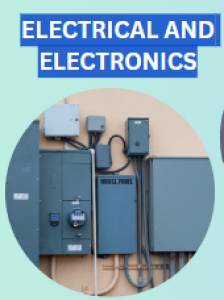Description
Electrical & Electronics: Powering Innovation
This comprehensive curriculum covers the foundational principles and advanced applications of electrical and electronics engineering, equipping students with the skills needed to excel in a rapidly evolving technological landscape. This isn't just theory; it's hands-on learning designed to bridge the gap between classroom knowledge and real-world application.
What You'll Learn:
This program provides a deep dive into both the theoretical underpinnings and practical implementations of electrical and electronics engineering, encompassing:
I. Fundamentals of Electrical Engineering:
- Circuit Analysis: Master the analysis of DC and AC circuits, including Kirchhoff's laws, mesh and nodal analysis, Thevenin and Norton theorems, and superposition. Develop a strong understanding of circuit components (resistors, capacitors, inductors) and their behavior.
- Electromagnetism: Explore the principles of electromagnetism, including Faraday's law, Ampere's law, and Maxwell's equations. Understand the relationship between electricity and magnetism, forming the basis for many electrical devices.
- Electrical Machines: Gain a comprehensive understanding of various electrical machines, including DC motors and generators, transformers, AC motors (induction and synchronous), and their applications in power systems and industrial automation.
- Power Systems: Learn the fundamentals of power generation, transmission, and distribution, including power system analysis, protection, and control. Understand different types of power systems and their challenges.
II. Fundamentals of Electronics Engineering:
- Semiconductor Devices: Deep dive into the operation of diodes, transistors (BJT and FET), and operational amplifiers (op-amps). Learn how these fundamental building blocks are used to design various electronic circuits.
- Digital Electronics: Explore digital logic gates, Boolean algebra, combinational and sequential logic circuits, flip-flops, counters, and registers. Gain experience designing and analyzing digital systems.
- Analog Electronics: Understand amplifier circuits, oscillators, signal conditioning, and filters. Learn techniques for designing and analyzing analog circuits.
- Microcontrollers & Microprocessors: Gain hands-on experience programming microcontrollers and microprocessors, including Arduino and ARM architectures. Learn to interface with sensors, actuators, and other peripherals.
III. Advanced Topics (Depending on Specialization):
- Embedded Systems: Design and implement embedded systems for various applications, including industrial control, consumer electronics, and automotive systems.
- Signal Processing: Learn techniques for analyzing and manipulating signals, including filtering, sampling, and transformation.
- Power Electronics: Design and control power electronic converters for various applications, including renewable energy systems and electric vehicles.
- Communication Systems: Explore the fundamentals of communication systems, including modulation, demodulation, and error correction.
Hands-on Learning:
The program emphasizes practical application through:
- Laboratory sessions: Conduct experiments to verify theoretical concepts and gain hands-on experience with various electrical and electronic components and equipment.
- Projects: Work on individual and group projects to design and build functional electrical and electronic systems.
- Simulation software: Utilize industry-standard simulation software to design, analyze, and test circuits and systems.
Career Opportunities:
Graduates of this program will be well-prepared for a wide range of careers in various industries, including:
- Power generation and distribution
- Telecommunications
- Automotive
- Aerospace
- Consumer electronics
- Robotics
- Automation
Who Should Enroll?
This program is ideal for students interested in pursuing a career in electrical and electronics engineering, as well as those seeking to enhance their existing knowledge and skills in this field. A strong foundation in mathematics and physics is recommended.
